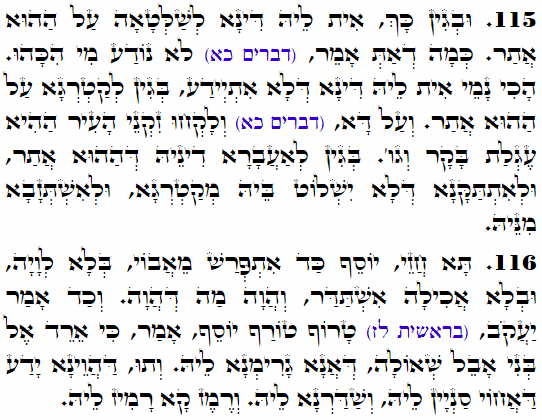Daily Zohar # 3814 – Vayigash – Our hands have not shed this blood
Daily Zohar 3814

Hebrew translation:
116. בֹּא רְאֵה, כְּשֶׁנִּפְרַד יוֹסֵף מֵאָבִיו, בְּלִי לְוָיָה וּבְלִי אֲכִילָה נִשְׁלַח, וְהָיָה מַה שֶּׁהָיָה, וּכְשֶׁאָמַר יַעֲקֹב (בראשית לז) טָרֹף טֹרַף יוֹסֵף, אָמַר כִּי אֵרֵד אֶל בְּנִי אָבֵל שְׁאֹלָה, שֶׁאֲנִי גָרַמְתִּי לוֹ, וְעוֹד – שֶׁהָיִיתִי יוֹדֵעַ שֶׁאֶחָיו שׂוֹנְאִים אוֹתוֹ וְשָׁלַחְתִּי אוֹתוֹ, וְרֶמֶז הוּא רָמַז לוֹ.
.
Zohar Vayigash
Continued from previous DZ
#115
Deuteronomy 21:1
“כִּי יִמָּצֵא חָלָל בָּאֲדָמָה אֲשֶׁר יְהוָה אֱלֹהֶיךָ נֹתֵן לְךָ לְרִשְׁתָּהּ נֹפֵל בַּשָּׂדֶה לֹא נוֹדַע מִי הִכָּהוּ.”
“If anyone is found slain, lying in the field in the land which YHVH your God is giving you to possess, and it is not known who killed him”
The angel of death can rule over the place where the dead person was found because it was not known who killed him. Because of that, he can bring accusations to that place and inflict judgments.
To remove the judgment from the place, the elders of the nearby city take a heifer and break its neck to remove the control of the angel of death and save the place.
Deuteronomy 21:4
“וְהוֹרִדוּ זִקְנֵי הָעִיר הַהִוא אֶת הָעֶגְלָה אֶל נַחַל אֵיתָן אֲשֶׁר לֹא יֵעָבֵד בּוֹ וְלֹא יִזָּרֵעַ וְעָרְפוּ שָׁם אֶת הָעֶגְלָה בַּנָּחַל.”
“The elders of that city shall bring the heifer down to a valley with flowing water, which is neither plowed nor sown, and they shall break the heifer’s neck there in the valley.”
Then the elders wash their hands over the heifer and say;
Deuteronomy 21:7
“וְעָנוּ וְאָמְרוּ יָדֵינוּ לֹא שָׁפְכוּ אֶת הַדָּם הַזֶּה וְעֵינֵינוּ לֹא רָאוּ.”
“Then they shall answer and say, ‘Our hands have not shed this blood, nor have our eyes seen it.”
#116
When Jacob asked Joseph to check on his brothers (Genesis 37:13), he sent him without escort and food, and then we read how Joseph’s life changed. When Jacob sees Joseph’s bloody coat, he said “A wild beast has devoured him. Without doubt Joseph is torn to pieces” (Genesis 37:33). He refused to be comforted because he knew that his brothers hated him and believed he was responsible for his death.
He couldn’t say, “our hands have not shed this blood,” as with the case above of the slain that no one knew who killed him.
This is the clue that Joseph sent to his father when he asked the brothers to take carts (עֲגָלוֹת) back home, which we explained above (#112,#113).
{||}

 Previous: Vayigash
Previous: Vayigash

